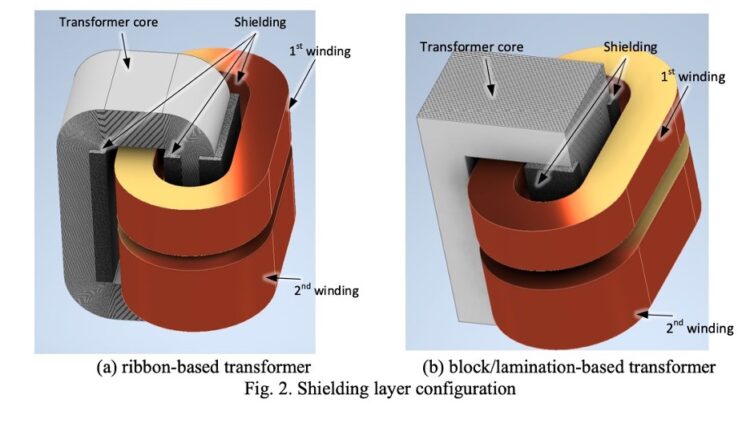Reducing Magnetic-Leakage Eddy Current Loss in Transformers/Inductors
The Problem
For traditional transformers and inductors with laminated cores, little attention is paid to eddy current loss attributable to leakage B-field flux and fringing effects. However, in modern high-power high frequency transformer applications, such eddy current loss effects can be dramatically increased when leakage magnetic fields become stronger. Existing solutions such as ferrite shielding, low-leakage transformer configurations, and smaller/narrower transformer core design are limited in practice due to difficulties with manufacturing and poor eddy current loss reduction.
The Solution
Researchers at the University of Tennessee have developed a novel 2D ribboned magnetic-core lamination structure and a novel ferrite-shielding pattern, result in minimized eddy current with minimal surface-area impact. Unlike traditional solutions to the eddy-current leakage problem, this technology can be more effective on eddy current reduction as the mechanism is well explained and is not limited by difficult geometry manufacturing.

Benefits
| Benefit |
|---|
| 2D lamination reduces surface areas for leakage-induced eddy current conduction, and hence suppresses eddy current loss. |
| Proposed ferrite shielding bypasses leakage magnetic field into air via low electric conductive ferrite materials. |
| Based on 2D lamination concept, novel core designs (ribbon, block, sheet, wire, etc.) and materials are revealed. |
| Low-loss leakage integration with eddy current loss reduced by 93% with estimated transformer efficiency above 99.3%. |
| Design and methodology applicable to multi-winding transformers and inductors. |
More Information
- Gregory Sechrist, JD
- Technology Manager, Multi Campus Office
- 865-974-1882 | gsechris@tennessee.edu
- UTRF Reference ID: 24028
- Patent Status: Patent Pending

Innovators
Zihan Gao

Min H. Kao Department of Electrical Engineering and Computer Science
Zihan Gao is a Ph.D. candidate in the Min H. Kao Department of Electrical Engineering and Computer Science at the University of Tennessee Knoxville. He is a part of the Center for Ultra-Wide-Area Resilient Electric Energy Transmission Networks (CURENT) Power Electronics Research group, and his research interests include medium voltage DC/DC converters and transformers.
Read more about Zihan GaoDr. Fei "Fred" Wang

Professor and Condra Chair of Excellence in Power Electronics, Min H. Kao Department of Electrical Engineering and Computer Science, UT Knoxville
Dr. Wang received his Ph.D. in Electrical Engineering from the University of Southern California in 1990. His research interests include Power Electronics, Power Systems, and Motor Drives.
Read more about Dr. Fei "Fred" Wang